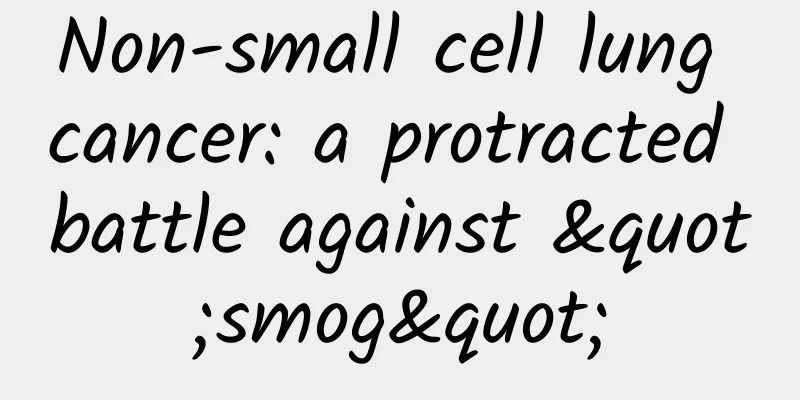Non-small cell lung cancer: a protracted battle against "smog"

|
Among many cancers, lung cancer has attracted much attention due to its high morbidity and mortality. Among lung cancers, non-small cell lung cancer accounts for a considerable proportion. It is a complex disease that is closely related to long-term smoking, air pollution and other environmental factors. In order to better understand non-small cell lung cancer, we need to have a deep understanding of its causes, development process, diagnosis and treatment methods. Let us join this protracted battle against "smog" and explore the mystery of non-small cell lung cancer. 1. Overview of non-small cell lung cancer Non-small cell lung cancer is a common type of lung cancer, accounting for more than 80% of all lung cancers. Compared with small cell lung cancer, non-small cell lung cancer grows and spreads relatively slowly. However, due to its unclear early symptoms, many patients are often diagnosed in the late stage, which greatly increases the difficulty of treatment. 2. Causes of Non-Small Cell Lung Cancer The main causes of non-small cell lung cancer are long-term smoking and air pollution. Harmful substances in tobacco can damage lung cells and increase the risk of cancer. In addition, long-term exposure to air pollutants, such as car exhaust and industrial waste gas, can also increase the risk of non-small cell lung cancer. Genetics, occupational exposure and chronic lung diseases are also some influencing factors. 3. Development process of non-small cell lung cancer The development of non-small cell lung cancer is a long process. At first, lung cells are damaged by tobacco or air pollutants, and gradually undergo gene mutations to form precancerous lesions. Over time, these abnormal cells gradually develop into non-small cell lung cancer. In this process, if it is discovered and treated in time, the risk of cancer cells spreading can be greatly reduced. Symptoms and diagnosis of non-small cell lung cancer The symptoms of non-small cell lung cancer are similar to those of other lung diseases, such as coughing, expectoration, and difficulty breathing. Since these symptoms may be mild in the early stages, they are easily ignored. As the disease progresses, the symptoms will gradually become more severe, with symptoms such as chest pain and weight loss. Diagnosis of non-small cell lung cancer requires a series of examinations, including physical examinations, imaging tests, and pathological examinations. Imaging tests such as X-rays and CT scans can observe lung abnormalities, while pathological examinations require microscopic examination of tissue samples obtained through biopsy or surgery to confirm the diagnosis. 5. Treatment of non-small cell lung cancer Treatments for non-small cell lung cancer include surgery, chemotherapy, and radiotherapy. The choice of treatment depends on the stage of the disease and the patient's physical condition. Early-stage patients usually receive surgery to remove the tumor to achieve the goal of cure. For advanced patients, chemotherapy and radiotherapy become the main treatment methods, aiming to shrink the tumor, control the disease, and prolong survival. In recent years, with the progress of targeted therapy and immunotherapy, more patients have benefited from new treatment methods and achieved better treatment effects and quality of life. 6. Prevention and health care of non-small cell lung cancer The key to preventing non-small cell lung cancer is to quit smoking and reduce exposure to air pollution. Quitting smoking can significantly reduce the risk of cancer, and reducing exposure to outdoor and indoor air pollution can also help reduce the risk of disease. In addition, maintaining good living habits, such as a balanced diet and moderate exercise, can also help maintain good health and prevent the occurrence of diseases. For high-risk groups, regular lung examinations are an important means of early detection of lung cancer. Through early detection and treatment, the cure rate and survival rate of non-small cell lung cancer can be greatly improved. Conclusion Non-small cell lung cancer is a long-term battle against "smog", which reminds us to pay attention to lung health and take active preventive measures. By quitting smoking, reducing pollution exposure and maintaining good living habits, we can reduce the risk of cancer. At the same time, regular lung examinations are also the key to early detection of lung cancer. Let us work together to create a better future for the health of ourselves and others! |
<<: Uterine fibroids: the "invisible bomb" of women's health
>>: Multiple myeloma: a rebellion of the body's "architects"
Recommend
Why is menstruation gray?
Women's menstruation is mainly menstrual bloo...
Can endometriosis be detected by ultrasound?
Endometriosis is a very common disease. When wome...
How to reduce fever quickly during confinement
Confinement is a critical period for women to rec...
Is alkaline water healthier? The "acid-base body theory" is completely pseudoscience!
I'm Busy, Quick Reading Edition The "aci...
Are you using several commonly used oral muscle training methods correctly?
In daily rehabilitation, we often hear parents ha...
How many days does it take for the blood to be clean after childbirth?
In fact, after a woman gives birth, it does not m...
How long after the second child is born can I have sex
We all know that women are not allowed to have se...
Very good Chinese medicine for treating mold
Fungus is often active in women and is prone to r...
Can I eat Oreo cookies while breastfeeding?
You should be careful when eating Oreos while bre...
Can I get pregnant with polycystic ovary?
Once a woman suffers from polycystic ovary syndro...
Is the Australian bat incident true? Why did bats attack Australia?
Is the Australian bat incident true? Today, there...
How to take care of yourself after hysterectomy
The uterus is a unique reproductive organ in the ...
How to set up the control center of a Huawei phone? How to check the SN code of a Huawei phone
Huawei mobile phones have created and developed d...
Severe osteoporosis, calcium and vitamin D supplementation are not effective, and bisphosphonates may be needed
An elderly friend left a message to Huazi, saying...
What anti-inflammatory medicine should I take for pubic hair acne
The female genitals are very fragile and can easi...









